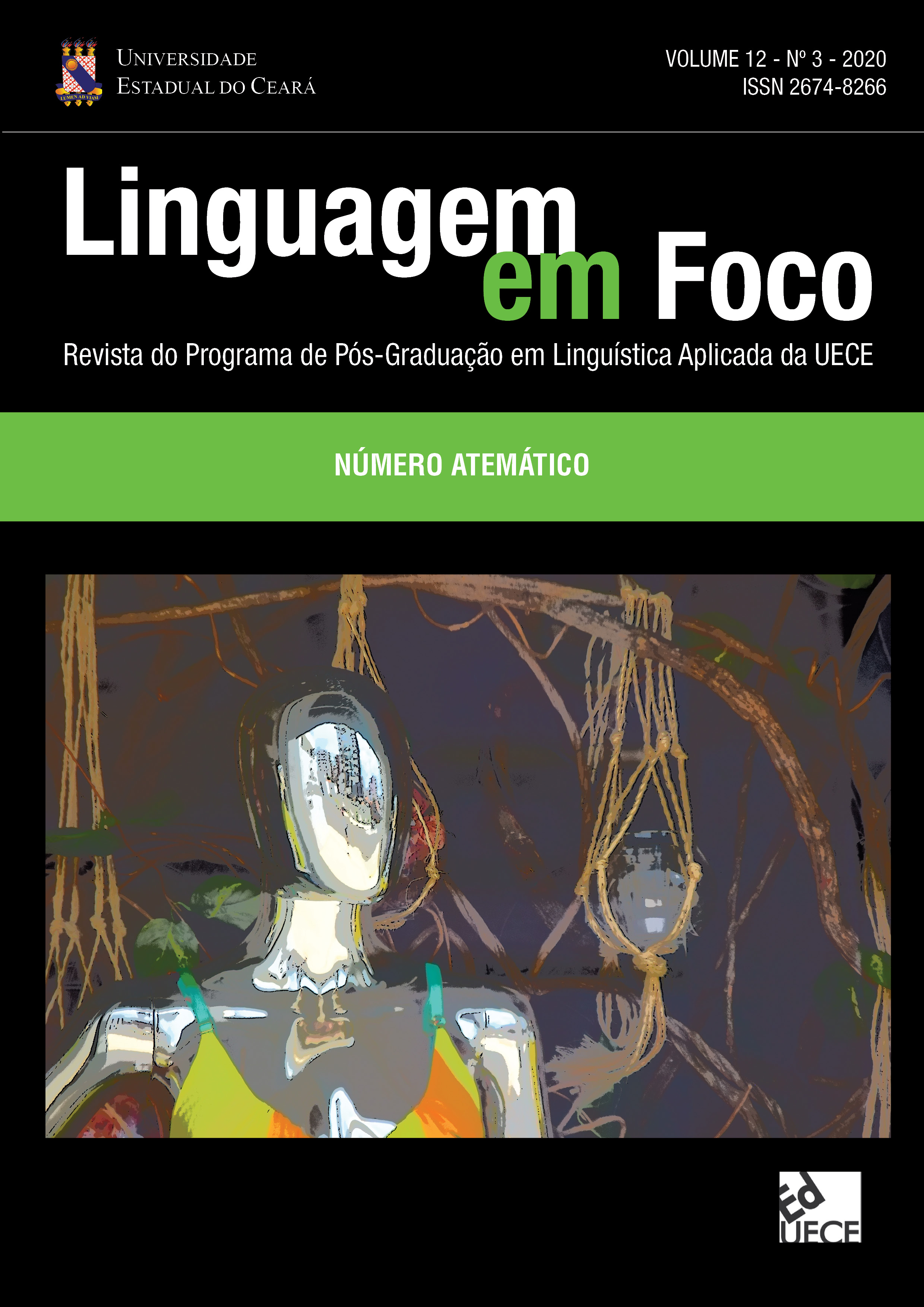O ingresso na prática docente dos letramentos sociais
Caminhos para (re) encontros com o mundo da leitura
DOI:
https://doi.org/10.46230/2674-8266-12-4323Palavras-chave:
Letramentos sociais, Etnografia educacional, PIBID/Língua PortuguesaResumo
O presente artigo discute uma proposta de letramento desenvolvida no PIBID, área de Letras/Português, a partir de um olhar etnográfico. Destacam-se a descrição e a reflexão das experiências dos bolsistas em um duplo processo: o primeiro diz respeito à formação do leitor-bolsista (re) construída por meio da narrativa autobiográfica e o segundo refere-se à construção da prática docente no processo de desenvolvimento da proposta de letramento na escola. Constituem-se como suporte teórico-metodológico deste estudo a Etnografia Educacional (ERICKSON, 1986; 1984) articulada a abordagens sociais para o trabalho com os letramentos – Novos Estudos do Letramento (STREET, 2014); Pedagogia dos Multiletramentos (GNL, 1996; ROJO, 2012) e Pedagogia Transmídia (PEREIRA & GOMES, 2019). Os resultados apresentados nos revelam a necessidade de enfrentamento dos problemas dos (não) letramentos sem ocultar a realidade local de desigualdade social de muitas das escolas públicas do país e confirmam a abordagem teórico-metodológica da Etnografia Educacional como um caminho para o trabalho com a leitura. Revelam ainda que o uso das tecnologias, incluindo a digital, pode ser uma solução para oferecer aos alunos acesso às obras literárias.
Downloads
Referências
AMORIM, M. “Para uma filosofia do ato: ´válido e inserido no contexto´.” In. BRAIT, B. (Org.) Bakhtin: dialogismo e polifonia. São Paulo: Contexto, 2009.
BAKHTIN, M. Estética da criação verbal. Trad. Paulo Bezerra.4. ed. São Paulo: Martins Fontes, 2003. p. 468.
ERICSON, F. Qualitative methods in reseach on teching. In: WITTROCK, M. C. (Org.). Handbook of research on teaching. New York: MacMillan, 1986. p. 119-161.
_________. What makes school ethnography ‘ethnography’? Anthropology and education quarterly. v. 15, nº 1. Spring, pp. 55-66, 1984.
FRITZEN, M. e LUCENA, M. (Orgs.). O olhar da etnografia em contextos educacionais: interpretando práticas de linguagem. Blumenau: Edifurb, 2012. p. 187.
GRUPO DE NOVA LONDRES. A Pedagogy of Multiliteracies: Designing Social Futures, In: COPE, B.; KALANTZIS, M. (Orgs.). Multiliteracies – Literacies Learning and the Design of Social Futures. New Yourk: Routledge, 2006 [1996], pp. 9-37.
JENKINS, Henry. Cultura da Convergência. 2ª ed. São Paulo: Aleph, 2009. 204.
KINCHELOE, J. L.; McLAREN, P. Repensando a Teoria Crítica e a Pesquisa Qualitativa. In. DENZIN, N. e LINCOLN Y. O Planejamento da Pesquisa Qualitativa: teorias e abordagens. Tradução de Sandra Regina Netz. Porto Alegre: Artmed, 2006. p. 281-314.
OLIVEIRA, A. 2013. Etnografia e pesquisa educacional: por uma descrição densa da educação. Educação UNISIN, v. 17, p. 271-280.
PEREIRA, A.S.; GOMES, L.F. Pedagogia transmídia na educação básica: um projeto de letramento no PIBID sob o enfoque dialógico-discursivo. In: AZEVEDO, I. C. M. de; COSTA, R.F. (Orgs.). Multimodalidade e Práticas de Multiletramentos no Ensino de Línguas. São Paulo: Blucher, 2019. p. 225-248. Disponível em: <https://openaccess.blucher.com.br/article-list/9788580394085-443/list#undefined>. Acesso em: 25 nov. 2019.
ROJO, R.; MOURA, E. (orgs.). Multiletramentos na escola. São Paulo: Parábola Editorial, 2012.p. 261.
STREET, B. Letramentos sociais: abordagens críticas do letramento no desenvolvimento, na etnografia e na educação. São Paulo: Parábola, 2014. p. 237.
THE NEW LONDON GROUP. A Pedagogy of Multiliteracies: Designing Social Futures. 1996. Disponível em: <http://newarcproject.pbworks.com/f/Pedagogy+of+Multiliteracies_New+London+Group.pdf>Último acesso em: 02 jun. 2018.
TODOROV, T. A literatura em perigo. Trad. Caio Meira. Rio de Janeiro: DIFEL, 2017. p. 96.
WINKIN, Y. A nova comunicação: da teoria ao trabalho de campo. Trad. Roberto Leal Ferreira, Campinas, SP: Papirus, 1998. p. 219.
Publicado
Como Citar
Edição
Seção
Licença
Os autores que publicam na Linguagem em Foco concordam com os seguintes termos:
- Os autores mantêm os direitos autorais e concedem à revista o direito de primeira publicação. Os artigos estão simultaneamente licenciados sob a Creative Commons Attribution License que permite a partilha do trabalho com reconhecimento da sua autoria e da publicação inicial nesta revista.
- Os conceitos emitidos em artigos assinados são de absoluta e exclusiva responsabilidade de seus autores. Para tanto, solicitamos uma Declaração de Direito Autoral, que deve ser submetido junto ao manuscrito como Documento Suplementar.
- Os autores têm autorização para disponibilizar a versão do texto publicada na Linguagem em Foco em repositórios institucionais ou outras plataformas de distribuição de trabalhos acadêmicos (ex. ResearchGate, Academia.edu).





























